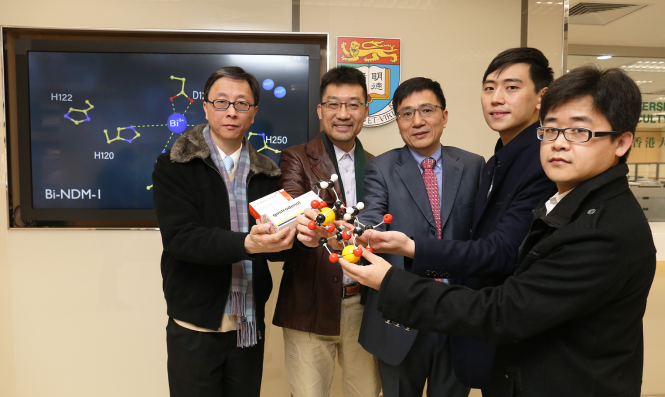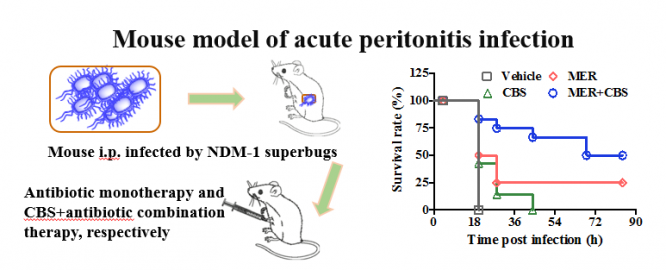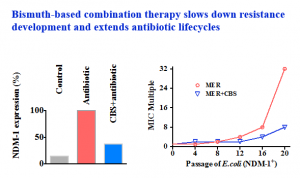Media
A novel solution to antimicrobial resistance — HKU medical chemists discover peptic ulcer treatment metallodrug effective in “taming” superbugs
08 Feb 2018

HKU research team (from left) Dr Ho Pak Leung, Dr Richard Kao Yi-Tsun, Professor Sun Hongzhe, Mr Wang Runming (PhD student and paper lead author) and Dr Gao Peng
Antimicrobial resistance posed by “superbugs” has been a major public health issue of global concern. Drug-resistant infections kill around 700,000 people worldwide each year. The figure could increase up to ten million by 2050, exceeding the number of deaths caused by cancers, according to figures of the World Health Organization (WHO).
Current clinical options for treating antibiotic resistant infections include increasing the prescribed antibiotic dose or using a combination therapy of two or more antibiotics. This might potentially lead to overuse of antibiotics, producing superbugs more resistant to antibiotics. Nevertheless, the development of antibiotic resistance far outruns the approvals of new antibacterial agents. While it may take a decade and cost an unusual high investment of USD 1 billion in average to bring a new drug to market, generating resistance to a new drug only requires a short couple of years by bacteria. Scientists and clinicians are in desperate need to discover an economic, effective, safe alternative strategy to meet the global public health challenge of antimicrobial resistance.
A research team led by Professor Sun Hongzhe of the Department of Chemistry, Faculty of Science and Dr Richard Kao Yi-Tsun of the Department of Microbiology, Li Ka Shing Faculty of Medicine, the University of Hong Kong (HKU) discovered an alternative strategy by repositioning colloidal bismuth subcitrate (CBS), an antimicrobial drug against Helicobacter pylori (H. pylori) -related ulcer.
They found the bismuth-based metallodrug to effectively paralyze multi-resistant superbugs, e.g. Carbapenem-resistant Enterobacteriaceae (CRE) and Carbapenem-resistant Klebsiella pneumoniae (CRKP) and significantly suppress the development of antibiotic resistance, allowing the lifespan of currently-used antibiotic to be largely extended. CRE and CRKP can cause deadly infections such as bacteremia, pneumonia, and wound infections.
The team is the first globally to link the “resistance-proof” ability of metallo-drug to the treatment of superbugs. This bismuth drug-based therapy looks set to become the last-line strategy against superbugs infections apart from development of new antibiotics. Since CBS is a US Food and Drug Administration (FDA)-approved drug, it will hopefully be rapidly ready for human clinical trials.
The findings were published in Nature Communications in January 2018 and a patent has been filed in the US for the discovery.
CRE is one of the three most dangerous superbugs on WHO's list of critical priority needs for new antibiotics. CRE resists almost all the clinically available antibiotics and spreads easily through person-to-person contact. If sepsis occurs, the death rate could be as high as 50%, according to the Centers for Disease Control (CDC) in the US.
The research team found that CBS as well as other relevant bismuth-based compounds could serve as potent inhibitors of NDM-1 (New Delhi Metallo-β-lactamase 1), one of the leading resistant determinants that demonizes common bacteria into CRE superbugs. This enzyme inhabits in bacteria and arms them with resistance to almost all commonly used beta-lactam antibiotics including the so-called “last resort” Carbapenem.
The NDM-1 carrying CREs is lethal and extremely difficult to treat, which poses a great threat to public health and may drive the world to the cusp of a "post-antibiotic era". Scientists report that NDM-1 superbugs have now been disseminated to over 70 countries or regions across the world.
Through a series of tests on an NDM-1 Escherichia coli (E. coli) (denoted as NDM-HK), clinically collected by Dr Ho Pak Leung, Director of the HKU Carol Yu Centre for Infection, the team revealed that CBS can “tame” the superbug reducing it to almost sensitive strain which can be easily killed by commonly used Carbapenem antibiotics.
More importantly, the brand-new therapy allows the dose of antibiotics to be reduced by 90% to attain the same level of effectiveness, and the development of NDM-1 resistance to be significantly slowed down, which will largely extend the life cycle of currently used antibiotics.
In the mouse model of NDM-1 bacterial infection, combination therapy comprising CBS and Carbapenem significantly prolonged the life expectancy and raised the eventual survival rate of infected mice by more than 25 percentage points compared to Carbapenem monotherapy. The research team now concentrates on using CBS-based therapy in other animal infection models, e.g. urinary tract infection (UTI), hoping to offer a more extensive approach to combat with antibiotic resistant superbugs.

Bismuth-based combination therapy extends the lifespan and raises survival rate of NDM-1 superbugs infected mice
Dr Ho found the results very encouraging, he said: “There is currently no effective approach to overcome the NDM superbug. Bismuth has been used clinically for decades. Knowing that it can tame the NDM is like “a good rain after a long drought” for the scientific community.”

In mouse model, NDM-1expression decreased by 2.7-fold (left) and resistance development slowed down by 4-fold (right)
Professor Sun said: “CBS has been clinically used for a long period of time in many countries and regions including Mainland China and Hong Kong, significantly enhances the eradication rate of resistant H. pylori. Surprisingly, no bismuth-resistant strain has been reported even after a long-term use. We hope CBS-based combination therapy will open up a new horizon for the treatment of infection caused by superbugs, serving as a new and more economical therapy to solve the problem of antimicrobial resistance (AMR).”
About Professor Sun Hongzhe's research team
Professor Sun is an internationally recognized expert of metallodrugs study and his achievements have been published in leading scientific journals before, including Proceedings of the National Academy of Sciences, Journal of the American Chemical Society and Angewandte Chemie International Edition. His research interest resides in the interdisciplinary field of inorganic chemistry and biomedicine. He is the convenor of the strategic research theme on "Integrative Biology" at the University of Hong Kong, with a multidisciplinary team of colleagues from chemistry, biology and medicine. His team has made systemic, integrative and innovative achievements on Metallomics and Metallo-chemical biology, including mode of action of bismuth-based drug and development of new techniques/methods for metals/metalloproteins in cells and tissues. He determined the polymeric structure of CBS (De-Nol®) under physiologically relevant condition and has focused on mechanism-based metallo-drug design.
About CBS
CBS is a non-toxic metallo-drug and is usually served as an anti-ulcer component in the “cocktail” therapy against H. pylori associated infections. Professor Sun’s team has been investigating metallo-drug design and its development for over 10 years, and his team team is in the international forefront of work in this area. In the previous studies, his team used an integrative approach to uncover dozens of bismuth-associated proteomes from H. pylori, unveiling bismuth’s multifactorial impact on the growth of this bacterium such as ROS defense, pH buffering and the interaction between bismuth and UreG protein. Also, he formulated a mathematical model to unravel the myths why bismuth is selectively toxic to some kinds of bacteria but not to human body. The research was highlighted by the Proceedings of the National Academy of Sciences.
About β-lactam antibiotics
β-lactam antibiotics are most widely used class of antibiotics for the treatment of bacterial infections, which include Penicillin derivatives (penams), Cephalosporins (cephems), Monobactams, and Carbapenems. Carbapenem has broader spectrum of antimicrobial activity and is less affected by many common mechanisms of antibiotic resistance than other beta lactam antibiotics, which has been used as the “last-resort” when patients received complicated infected by antibiotic resistant bacteria. Once bacteria carry NDM-1, they will be extremely tough to kill even with high dose of carbapenem.

CBS inhibits the activities of major resistant determinant NDM-1 replacing its zinc cofactors with bismuth
The research paper published in Nature Communications
https://www.nature.com/articles/s41467-018-02828-6?WT.feed_name=subjects_biotechnology
How CBS works on NDM-1 superbugs animation download
Other images download
http://www.scifac.hku.hk/news/media?page=1
For media enquiries, please contact Ms Cindy Chan, Senior Communication Manager, Faculty of Science, HKU (tel: 3917 5286/ 6703 0212; email: cindycst@hku.hk), or Ms Melanie Wan, Senior Manager (Media), Communications and Public Affairs Office, HKU ( tel: 2859 2600/ email: melwkwan@hku.hk)
